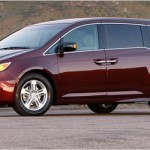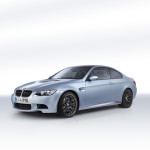Luxury German car manufacturer BMW has been forced to recall some 360,000 cars, a spokesman told AFP Thursday, after tests revealed two separate faults on its vehicles.
BMW recalled 120,000 diesel-engine cars in Europe — including 35,000 in Germany — after discovering the fuel filter on the 1-series and 5-series could continue to operate even after the motor had stopped.
This could in extreme cases lead to a fire, although the company stressed that no such incident had been reported.
The second recall concerned 240,000 3-series vehicles sold in the United States and Canada, produced between 2002 and 2005.
These cars were recalled due to a potential partial malfunction in the brake lights, the firm said, again stating that no accident had been reported due to the fault.
Meanwhile, General Motors on Thursday reported an 18 per cent jump in its US auto sales in August despite recent market turmoil, and expressed cautious optimism about the state of the US economy.
“Our balanced portfolio of trucks and fuel-efficient vehicles like the Chevrolet Cruze, Chevrolet Equinox and GMC Terrain are helping GM continue to gain market share, which has now increased in seven of the past eight months,” Don Johnson, vice president for US sales, said in a statement.
“We’re carrying good momentum and we’re cautiously optimistic that we’ll see US economic growth improve in the months ahead.”
Strong retail sales helped GM boost deliveries 18 per cent to 218,479 vehicles last month and lower-margin fleet sales also posted gains, the automaker said.
GM said it is “closely monitoring consumer sentiment and other economic indicators” but has not changed its forecast for overall 2011 industry sales, which it expects to be in the “low end” of the 13-13.5 million vehicle range.
“Marketing and incentive focus has already shifted to September with the upcoming Labour Day weekend, so with improved inventory, the sales pace could show marked improvement next month.”
JD Power forecasts that August sales will slip to a seasonally adjusted annualised rate of 11.9 million vehicles, down from 12.2 million in July.
Final industry sales figures were expected later yesterday.
In a related development, .S. manufacturing unexpectedly grew in August and fewer Americans filed new claims for jobless aid last week, defying a slump in confidence that threatened to push the economy back into recession.
The Institute for Supply Management (ISM) said on Thursday its index of national factory activity ticked down to 50.6 from 50.9 in July. The modest slowdown confounded economists’ expectations for a fall to 48.5.
Any reading below 50 indicates a contraction in the nation’s factory sector.
A separate report from the Labour Department showed initial claims for state unemployment benefits dropped 12,000 to 409,000, showing little sign of a pick-up in layoffs in the wake of declining business and consumer confidence.
“We’ve gotten a few better reads from data, and my general sense is that things aren’t as bad as the headlines read. Companies aren’t seeing dramatic change,” said Tom Porcelli, U.S. economist at RBC Capital Markets in New York.
U.S. stocks erased losses on the manufacturing data, while Treasury debt prices trimmed gains. The dollar rose against a broad basket of currencies.
However, key details of the ISM survey were soft and initial claims remained perched above the 400,000 level usually associated with a stable labour market.
That indicated the pace of economic growth would remain slow, but further reduced the odds of a second recession.
“The net result is a slowdown, disappointing growth for the third quarter but not a recession,” said John Silvia, chief economist at Wells Fargo in Charlotte, North Carolina.
Data ranging from consumer spending to industrial production have showed some strength in the economy after output barely grew in the first half of the year.
While the claims data has no bearing on August’s nonfarm payrolls count to be released on Friday, it showed no evidence that businesses responded to the recent financial market turmoil by aggressively laying off workers.
Other reports suggested consumers also did not pull back in August. Many top U.S. retailers on Thursday reported better-than-expected sales last month, despite sagging consumer confidence and Hurricane Irene.










